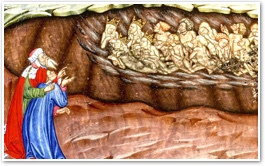The seven capital sins of the Internet
- DANIEL ESPARZA
According to one of the founders of LinkedIn, each social network corresponds to one of the seven deadly sins.
 At a conference in 2011, transcribed by the Wall Street Journal and republished recently by The Atlantic, one of the founders of LinkedIn, Reid Hoffman, suggested a theory that would explain the success or failure of social networks: each is related, in more than one way, with one of the seven deadly sins. The suggestion isn't so crazy: Facebook is vanity, Netflix is sloth, and Tinder — need we say it? — is obviously lust.
At a conference in 2011, transcribed by the Wall Street Journal and republished recently by The Atlantic, one of the founders of LinkedIn, Reid Hoffman, suggested a theory that would explain the success or failure of social networks: each is related, in more than one way, with one of the seven deadly sins. The suggestion isn't so crazy: Facebook is vanity, Netflix is sloth, and Tinder — need we say it? — is obviously lust.
The question that Reid Hoffman asked himself is simple: why do the social networks which are, in fact, successful, have so little (or absolutely nothing) to do with good causes or totally real needs? According to Hoffman, it's because those causes and needs aren't sufficiently "sinful." Robinson Meyer, of The Atlantic, describes possible relationships between the most popular social networks and the seven capital sins.
Lust:
According to Dante's Inferno, lustful souls remain forever trapped in a hurricane that gives them no rest. Tinder users could be having a similar experience: that of sliding their finger to the right in the application, without ever finding someone with whom to start a serious relationship.
Gluttony:
Instagram is for gluttons. The mythological character Tantalus was punished in Tartarus, such that whenever he tried to eat or drink, the fruit or water drew away from him; in the same way, when we browse on Instagram, we run into a flood of images shared by foodies depicting meals we cannot eat — at least, not on the screen.
Greed:
Dante explains how greedy souls are condemned to fight among themselves forever in hell, throwing immeasurably heavy boulders at each other. According to Meyer, this is like the professional competition you see on LinkedIn.
Sloth:
Although it is not a social network, Netflix is one of the preferred ways to lose time nowadays — although we call it "procrastination" instead of "laziness."
Wrath:
In Dante's fifth circle of hell, the wrathful are condemned to attack each other endlessly, without any of them gaining and advantage over others. Isn't that an exact description of our arguments on Twitter?
Envy:
Basically, envy makes us feel so desirous of what we don't have, that we end up not appreciating what we actually do have. That's what Pinterestis for.
Pride:
There are varying opinions regarding pride, the worst of all sins, which basically consists in believing that you are essentially better than your neighbor. Hoffman states that pride corresponds to Facebook; according to Meyer, however, Medium (or one of the other blogging platforms) could be pride instead. It's a way of saying, "I know how to say what you think you know, and I say it better, so go ahead and share my article."
But if Facebook isn't pride, then what is it? Vanity or vainglory is unlimited and unfounded confidence in one's own attractiveness, and an uncontrollable desire to praise it. In Meyer's opinion, this is what draws people to Facebook: the ability to offer online the best possible version of your own life, carefully editing each of its ups and downs.
 This is Meaghen Gonzalez, Editor of CERC. I hope you appreciated this piece. We curate these articles especially for believers like you.
This is Meaghen Gonzalez, Editor of CERC. I hope you appreciated this piece. We curate these articles especially for believers like you.
Please show your appreciation by making a $3 donation. CERC is entirely reader supported.

Acknowledgement
Daniel Esparza. "The seven capital sins of the Internet." Aleteia (June 28, 2017).
This article is reprinted with permission of Aleteia. Find the original here.
The Author
Daniel Esparza works as Coordinator and Editor of the Information and Entertainment section for the English Edition of Aleteia.
Copyright © 2017 Aleteia



